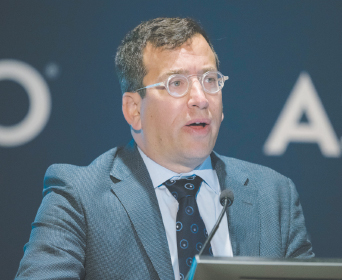Before the introduction of immunotherapy with checkpoint inhibitors, the 5-year life expectancy for patients with advanced non–small cell lung cancer (NSCLC) was 5.5%. This dismal outlook has changed. Treatment with the immune checkpoint inhibitor pembrolizumab dramatically improved overall survival in this group of patients, according to 5-year follow-up data from the phase Ib KEYNOTE-001 clinical trial. The greatest benefit of pembrolizumab was observed in patients with high programmed cell death ligand 1 (PD-L1) expression (≥ 50%).1

The fact that we have patients on this trial who are still alive after 7 years is quite remarkable.— Edward B. Garon, MD
Tweet this quote
For chemotherapy-naive patients at the time of treatment with pembrolizumab, the estimated 5-year survival was 23.2%. For previously treated patients, the estimated 5-year survival was 15.5%. In patients with PD-L1 expression of at least 50%, the 5-year overall survival was 29.6% in treatment-naive patients and 25% in previously treated patients. For patients who received pembrolizumab for 2 years or more, the 5-year survival was 75%.
These data represent the longest follow-up study to date of people with advanced NSCLC treated with pembrolizumab, and they are expected to change the discussion oncologists have with their patients who have lung cancer, experts agreed. The study was presented at the 2019 ASCO Annual Meeting and published simultaneously online in the Journal of Clinical Oncology.2
“The uniformly negative outlook that has been associated with a diagnosis of advanced non–small lung cancer is certainly no longer appropriate. The fact that we have patients on this trial who are still alive after 7 years is quite remarkable. We also have evidence that most patients who are doing well after 2 years on pembrolizumab live for 5 years or more,” said lead author Edward B. Garon, MD, Associate Professor of Medicine at UCLA, Los Angeles.

These data are similar to what we have seen in other cancers treated with immunotherapy in that there is a population of patients who can live for 5 years or more.— David L. Graham, MD, FASCO. ©Levin Cancer Institute
Tweet this quote
ASCO expert David L. Graham, MD, FASCO, of the Levine Cancer Institute, Charlotte, North Carolina, commented: “These data are similar to what we have seen in other cancers treated with immunotherapy in that there is a population of patients who can live for 5 years or more. It’s truly remarkable that for more patients than ever before, we no longer have to count survival in months.”
“We used to have to tell patients their chances down the road were uniformly bad. Now one in four of them will be around in 5 years. This changes our mind set,” Dr. Graham added.
“Another important point is that appropriately funded studies are needed to gather data like these over time. Without such funding, we would not have learned that this group of people were alive at 5 years. This highlights the theme of our meeting. We are learning from our patients every day,” Dr. Graham said.
“We still have a long way to go to improve outcomes for all patients with advanced NSCLC. We look forward to more research that will help us determine the best way to select patients for treatment,” Dr. Graham added.
KEYNOTE-001
The patients enrolled in KEYNOTE-001 were the first cohort to receive pembrolizumab for advanced lung cancer, and the 5-year results presented at the 2019 ASCO Annual Meeting represent mature overall survival.
“The phase I trial enrolled more than 1,000 patients and led to approval for melanoma and the PD-L1 diagnostic assay,” Dr. Garon reminded the audience.
KEYNOTE-001: 5-YEAR RESULTS
- These findings provide the longest-term data on patients with advanced lung cancer treated with pembrolizumab.
- The findings demonstrate greatly improved survival on pembrolizumab compared with historical expectations.
- Survival is related to PD-L1 expression level, but responses are seen at all levels.
In 2016, pembrolizumab was approved as first-line treatment for advanced NSCLC that lacked EGFR or ALK mutations but expressed PD-L1 on 50% or more of tumor cells. Expanded approval was granted for the front-line treatment of patients with stage III NSCLC who are not amenable to surgery or radiation or who have NSCLC with PD-L1 expression of more than 1% and no EGFR or ALK mutation.
KEYNOTE-001 included 550 patients with advanced lung cancer; 449 received previous systemic treatment and 101 were treatment-naive. Patients were treated with pembrolizumab at 2 mg/kg body weight every 3 weeks or 10 mg/ kg every 2 or 3 weeks. The protocol has been changed, and now the typical regimen is a single dose of 200 mg regardless of body weight every 3 weeks.
At a median follow-up of 60.6 months, 100 patients enrolled in KEYNOTE-001 were still alive. The median duration of treatment was 3.3 months (range, 1 day–75.9 months). A total of 60 patients were treated with pembrolizumab for 2 years or longer (14 [14%] in the treatment-naive group and 46 [10%] in the previously treated group).
Key Findings
The median overall survival was 22.3 months for treatment--naive patients and 10.5 months for previously treated patients. Among treatment-naive patients, the 2-year overall survival rate was 49%, the 3-year overall survival rate was 37%, and the 4-year overall survival rate was 31%. Among previously treated patients, the overall survival rates at 2, 3, and 4 years were 30.1%, 20.9%, and 18.2%, respectively.
PD-L1 expression of at least 50% was associated with longer overall survival. Among treatment-naive patients with PD-L1 expression of at least 50%, the median overall survival was 35.4 months, and the 5-year overall survival rate was 29.6%. Among patients with PD-L1 expression between 1% and 49%, the median overall survival was 19.5 months, and the 5-year survival was 15.7%.
KEYNOTE-001
For more information on the long-term KEYNOTE-011 results with pembrolizumab in non–small cell lung cancer, see an interview with Edward B. Garon, MD, on The ASCO Post Newsreels at www.ascopost.com/videos.
Among previously treated patients with PD-L1 expression of at least 50%, the median overall survival was 15.4 months, and the 5-year overall survival was 25% compared with 8.5 months and 12.6% among patients with PD-L1 expression between 1% and 49%, and 8.6 months and 3.5% among patients with PD-L1 expression up to 1%.
Of the 100 patients alive at the data cutoff, 78% had an objective response, and complete responses were seen in 1 treatment-naive patient and 5 previously treated patients.
“These data are encouraging,” Dr. Garon stated. “Taken together with data from other randomized controlled trials, efficacy outcomes and the observed association between PD-L1 expression and overall survival are consistent. The results highlight the potential for long-term benefit that may be realized through individualized treatment selection.”
Safety Profile
Treatment-related adverse events were reported in 71% of patients with lung cancer. Grades 3 to 5 treatment-related adverse events occurred in 13%. After the first report of safety in 2015, just three additional treatment-related grade 3 to 5 adverse events occurred—hypertension, glucose intolerance, and hypersensitivity reaction—as reported at a median of 3 years’ follow-up.3

Edward B. Garon, MD, presenting Abstract LBA9015 at the 2019 ASCO Annual Meeting. Photo by © ASCO/Phil McCarten 2019.
Serious adverse events occurred in 42%, including 9% with treatment-related serious adverse events. A total of 31 patients discontinued pembrolizumab due to treatment-related adverse events, and 9 are still alive (7 in ongoing response). Two deaths due to treatment-related adverse events were reported, both within the first 32 days of treatment.
A total of 17% of patients experienced an immune-related adverse event, and 32 of these 92 patients were still alive at data cutoff. The most common immune-mediated adverse events of all grades included hypothyroidism (9%), pneumonitis (5%), and hyperthyroidism (2%). Grade 3 to 5 immune-related adverse events were reported in 4%.
Additional Commentary
At an ASCO press conference, Senior Vice President and Chief Medical Officer of ASCO, Richard L. Schilsky, MD, FACP, FASCO, FSCT, commented on the phenomenon of the apparent lack of association of complete response with survival in patients treated with checkpoint inhibitor therapy. “There is a great deal of literature on the importance of achieving complete response in association with long-term outcomes in patients with cancer. This appears to be different with checkpoint inhibitor therapy. The lesion improves but does not go away completely,” Dr. Schilsky noted. Dr. Garon agreed and said it is not completely clear why this occurs.
Among 60 patients taking pembrolizumab for 2 or more years, the estimated 5-year survival was 78.6% in the treatment-naive group and 75.8% in the previously treated group. ■
DISCLOSURE: Dr. Garon disclosed financial ties with Dracen Pharmaceuticals, Merck, Genentech, AstraZeneca, Novartis, Lilly, Bristol-Myers Squibb, Mirati Therapeutics, Dynavax, Iovance Biotherapeutics, EMD Serono, and Neon Therapeutics. Dr. Graham is employed by Medscape and is on the speakers bureau for Biopep Solution. Dr. -Schilsky has received institutional research funding from AstraZeneca, Bayer, Bristol-Myers Squibb, Genentech/Roche, Lilly, Merck, and Pfizer.
REFERENCES
1. Garon EB, Hellmann MD, Costa EC, et al. Five-year long-term overall survival for patients with advanced NSCLC treated with pembrolizumab: Results from KEYNOTE-001. 2019 ASCO Annual Meeting. Abstract LBA9015. Presented June 2, 2019.
2. Garon EB, Hellmann MD, Rizvi NA, et al. Five-year overall survival for patients with advanced non-small-cell lung cancer treated with pembrolizu-mab: Results from the phase I KEYNOTE-001 study. J Clin Oncol. June 2, 2019 (early release online).
3. Leighl NB, Hellmann MD, Hui R, et al: Pembrolizumab in patients with advanced non-small-cell lung cancer (KEYNOTE-001): 3-year results from an open-label phase 1 study. Lancet Respir Med 7:347-357, 2019.

